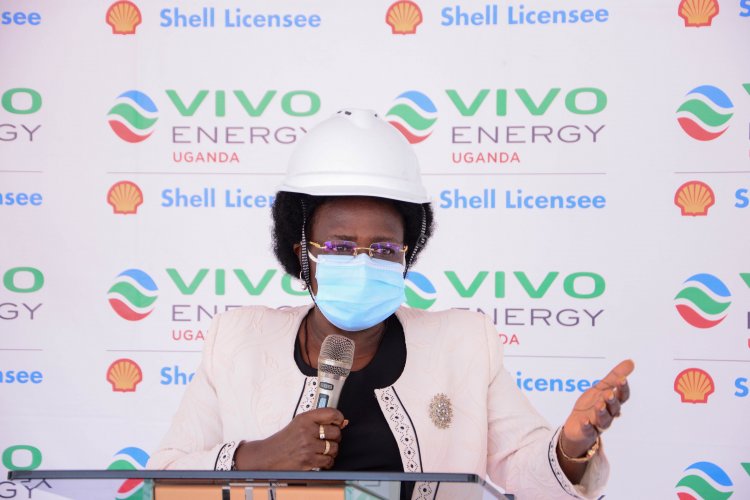Minister of Energy Lauds Vivo Energy Uganda on Uganda’s first fuels laboratory ISO certification.
Vivo Energy's accreditation is a confirmation of our ability to conduct correct, verifiable and replicable test results at our laboratory, the first of its kind in the country. With this certification, customers can be assured that the products at any of our Shell service stations meet the same quality as what is sold in global markets.

The Minister of Energy and Mineral Development Dr. Mary Goretti Kitutu has lauded Vivo Energy Uganda for having the first ISO certified Fuels Laboratory in Uganda.
Vivo Energy Uganda’s Fuels Laboratory was recently awarded the first International Organisation for Standardization (ISO) 17025:2017 certification, the highest accreditation globally in the energy business.
The Minister was officiating at the unveiling of the certification at the Vivo Energy Uganda depot in Industrial Area, Kampala.
Dr. Kitutu said that by becoming (ISO) 17025:2017 certified, Vivo Energy Uganda has committed itself to providing only quality products for its customers and creating the assurance to all stakeholders that they comply with international standards of testing and providing accurate results.
“This is a step forward towards our fight against fuel adulteration and poor-quality products on the market. The government of Uganda and all stakeholders need to work together to ensure that more players in the business get certified to ensure the safety of products, equipment and machinery”. Dr Kitutu said.
The Minister also urged the Uganda National Bureau of Standards to work with players in the energy sector to reduce and eliminate fake fuels from the market.
“Our environment, health and indeed our safety are at risk as a result of fake fuels and lubricants on the market. We need to work together to get sustainable solutions and getting certified, is one of them. I thank Vivo Energy Uganda for take this initiative,” she added.
Mr. Gilbert Assi, the Vivo Energy Managing Director, said that this is a continuous journey that the company has embarked on over the last few years, in order to ensure safe and high quality products on the market.
“As a leading player in the energy industry, we have a responsibility to provide high quality products to our customers. This accreditation is therefore, a confirmation of our ability to conduct correct, verifiable and replicable test results at our laboratory, the first of its kind in the country. With this certification, customers can be assured that the products at any of our Shell service stations meet the same quality as what is sold in global markets.
“We started the journey to get certified a few years back and so far, we have four certifications. In addition to the ISO17025:2017, Vivo Energy Uganda is certified with ISO 9001: 2015 Certification for Implementing Quality Management Systems, ISO 14001:2015 Certification for Environmental Management System and ISO 45001:2018 Certification for Occupational Health and Safety. We will not relax until we have got all the energy related certifications and we are optimistic that we shall get there.” Hans Paulsen the Vivo Energy’s Executive Vice President for East and Southern Africa said.
Mr. Peter Kitimbo the Manager, Fuel Testing Laboratories at Uganda National Bureau of Standards asked Ugandans to work with UNBS in the fight against fake products, especially adulterated fuels. He asked players to be transparent and work towards certification as the global business market continues to be competitive.
“We have worked with Vivo Energy Uganda towards this milestone and we urge all players to take this route as the only sustainable way to satisfy our customers. The process is lengthy, but with commitment its achievable, like Vivo Energy Uganda has done,” Mr. Kitimbo said.
Uganda has a Fuel Marking and Quality Monitoring Programme (FMP) designed to control and monitor the quality of petroleum products in the entire supply chain in Uganda. The programme was introduced in Uganda in 1999 by the Ministry of Energy and Mineral Development (MEMD) in collaboration with the Fuel Marketing Companies and Uganda National Bureau of Standards (UNBS), with the main objective of monitoring the quality of imports of petroleum products among others.












